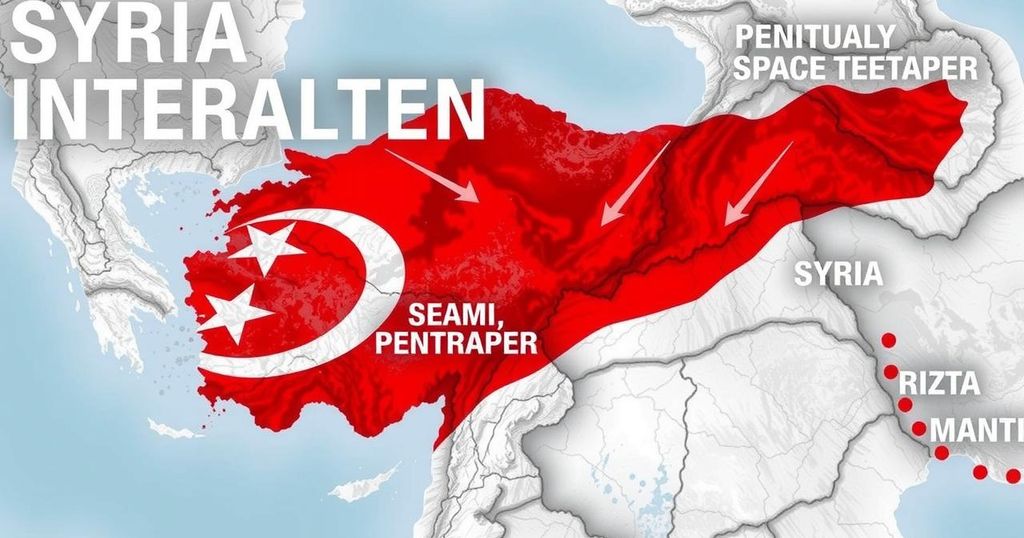Turkey’s Strategic Maneuvering in Post-Assad Syria

Turkey has emerged as a dominant force in Syria following the rapid collapse of Bashar al-Assad’s government. Turkish officials anticipate future stability while advocating for dialogue between opposing factions. The administration aims to facilitate the return of over three million Syrian refugees and lead post-war reconstruction efforts. Turkey’s strategic interests focus on maintaining regional security and establishing governance amidst ongoing challenges.
In the wake of recent developments in Syria, Turkey has emerged as a formidable actor following the swift fall of Bashar al-Assad’s government. Turkish officials had anticipated Assad’s collapse but were caught off guard by its rapidity and the subsequent territorial gains made by Syrian opposition forces, specifically those allied with Hay’at Tahrir al-Sham (HTS). Turkey’s strategy was initially to launch a limited operation to pressure the Assad regime, particularly in response to ongoing airstrikes in Idlib that forced civilians towards Turkey’s borders.
As the Syrian military crumbled, Turkish influence became increasingly evident in the region, allowing for the capture of strategic urban areas. Turkish President Recep Tayyip Erdogan’s announcement of forthcoming security measures for Turkey’s southern borders underscored the urgency of Turkey’s involvement. Turkey has advocated for ongoing dialogue between the Syrian government and opposition groups, emphasizing the need to maintain the integrity of state institutions.
Ahmed al-Sharaa, also known as Abu Mohammad al-Jolani, the leader of HTS, has demonstrated a willingness to engage politically, retaining the Syrian government’s administrative framework while extending reassurance to various communities. Current insights indicate that Turkey is keen on leveraging its experience in governance and administration within northern Syria to facilitate a transitional government post-Assad.
Experts emphasize Turkey’s consistent commitment to backing the Syrian opposition, noting that its efforts have shaped the political landscape in the region. Turkish officials are poised to ensure a governance model that accommodates diverse political factions while addressing significant challenges, including energy resources dominated by the US-backed Syrian Democratic Forces (SDF).
Turkey also faces the pressing issue of repatriating over three million Syrian refugees residing in its territory. A gradual return is anticipated, contingent on the establishment of security and reconstruction efforts in Syria, a process Turkey intends to lead. Various stakeholders, including the Organisation of Islamic Cooperation (OIC) and Gulf nations, are expected to play significant roles in providing financial support for Syria’s extensive reconstruction needs following years of conflict.
The situation in Syria has been volatile since the onset of the civil war, which began in 2011. Bashar al-Assad’s regime has faced significant opposition, particularly from various armed groups, leading to widespread destruction and regional instability. Turkey has been a key player in the Syrian conflict, supporting opposition groups while managing refugee flows across its borders. The recent surge in Syrian opposition forces’ capabilities has reopened discussions around governance, resource control, and the conditions necessary for the safe return of displaced persons. Turkey’s strategic interests in the region dictate its involvement, focusing on ensuring national security and influencing the political dynamics in post-war Syria.
Turkey’s escalating role in the Syrian conflict signifies its strategic interests in the region, emphasizing a multifaceted approach to governance, humanitarian aid, and security. As Turkish officials navigate the complexities of Syrian affairs, the focus on facilitating conversations among political factions highlights doubts about the future governance of Syria post-Assad. Furthermore, the anticipated repatriation of Syrian refugees and extensive reconstruction efforts underscore the challenges ahead, with Turkey expected to spearhead these initiatives. The outcomes of these developments will significantly affect the stability of both Turkey and Syria in the coming years.
Original Source: www.middleeasteye.net







